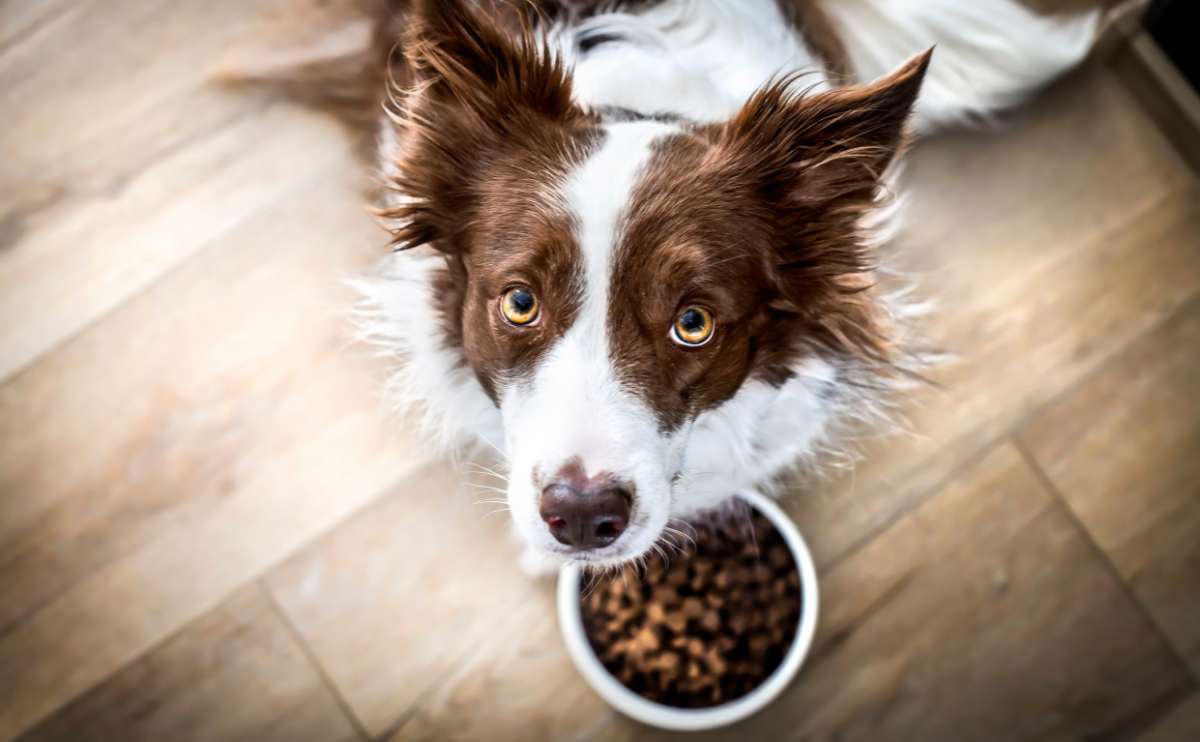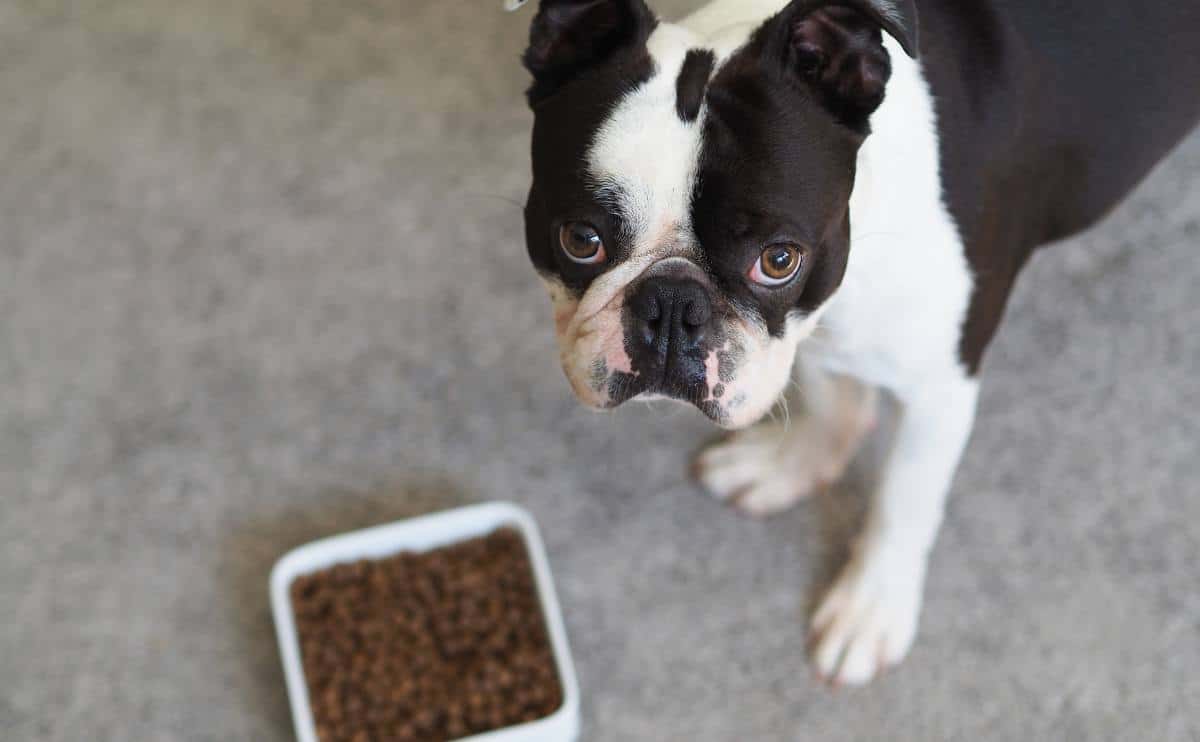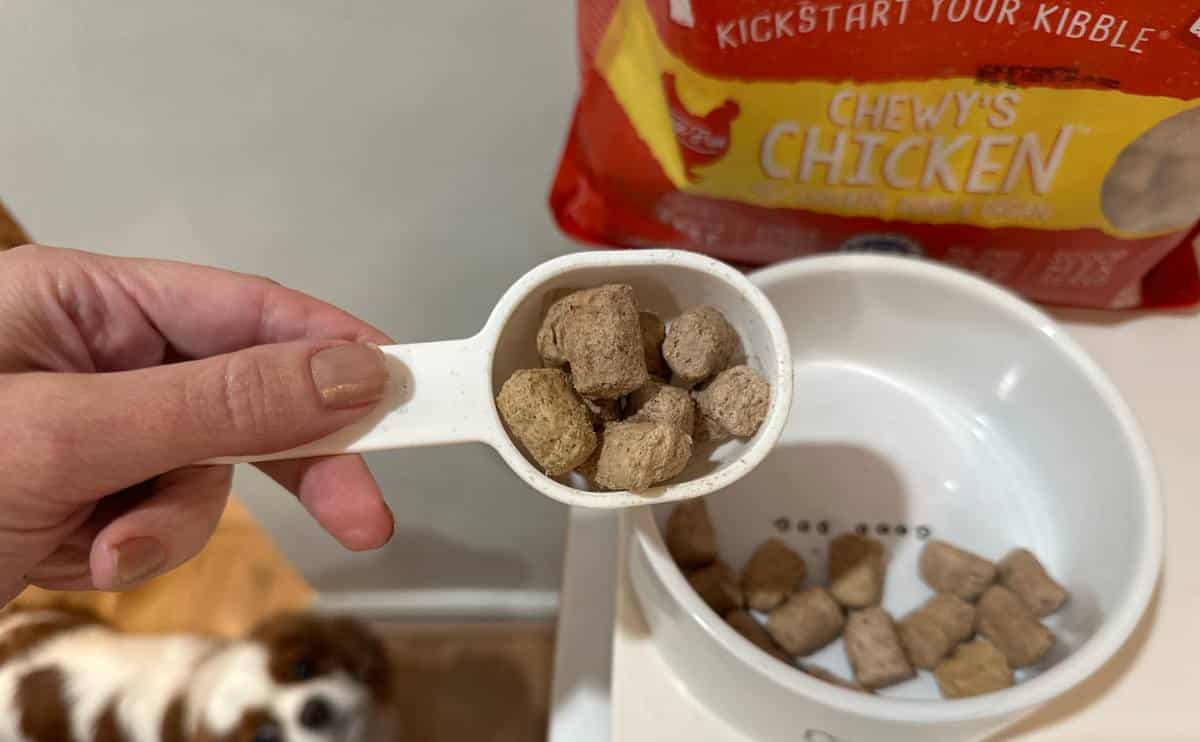When you purchase through links on our site, we may earn a commission. Here’s how it works.

Chances are you know at least one person who has gone gluten or grain-free, who cites the benefits of the Paleo Diet or quotes from the bestselling books Wheat Belly and Grain Brain. Grocery stores have made shelf space for gluten-free pasta, crackers, cereals, cookies, and cake mixes, and restaurants offer gluten-free pizza and beer to appeal to grain-free customers.
But what about our four-legged fur babies? Learn more about the pros of going grain-free and how it can benefit your pup. Plus, our top picks for grain-free dog foods should you (and your vet) decide that’s the best route for your pup.
- Is Grain Free Bad For Dogs? New Research Suggests Not Necessarily
- Grain-Free Dog Food History
- Does My Dog Have A Food Allergy?
- Breeds At Higher Risk For Food Allergies
- What Are The Benefits Of Grain-Free Dog Food?
- Is Grain-Free Food Good For Dogs?
- Alternative Grain Formulas
- Best Grain-Free Dog Food
- Will Your Dog Go Grain-Free?
Is Grain Free Bad For Dogs? New Research Suggests Not Necessarily
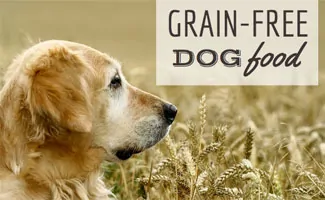
As a diligent pup owner, you likely have heard of the major controversy over the last few years about whether grain-free dog food is healthy. The concern that became “hype” started in 2018, when the U.S. Food and Drug Administration announced it was investigating a possible link between non-hereditary canine dilated cardiomyopathy (DCM) and dogs eating certain grain-free pet foods after reviewing more than 500 recent cases of DCM.
In nearly all of these cases, the dog had been regularly eating a mostly grain-free product, the initial FDA report said. However, in 2020, the FDA confirmed that they had not found a causal link between grain-free diets and the rise of DCM.
Fast forward to 2024. The FDA now has received over 1,300 cases of non-hereditary cases of DCM. But, since 2018, scientists have been exploring this potential health link between dog food and DCM. According to Tufts University of Veterinary Medicine,
“a growing body of research lends evidence that diet-related DCM appears to be more closely associated with diets containing high levels of pulses [peas, lentils, chickpeas, etc.], rather than with the presence or absence of grains in a diet.”
Furthermore, this research suggests that most of the diets associated with the reports of non-hereditary DCM have pulses (legume seed ingredients) high in their ingredient lists in both grain-free and grain-inclusive formulas. However, it’s important to keep in mind that the specific cause still remains unknown.
Grain-Free Dog Food History
Long before dog food was scooped from a bag into personalized doggie dishes, canines would hunt and capture raw, protein-rich meals. After all, you don’t see wolves grazing peacefully in a field of flowers. Just like the theory behind the Paleo Diet for humans, protein-based, grain-free dog foods more closely mimics a canine’s natural or “ancestral” diet as a carnivore. However, with the introduction of mass-produced dog kibble around World War II, inexpensive fillers like corn, wheat, and barley were added to dog food to create bulk and keep costs down. Today, most commercial dog foods still list corn or wheat as one of the main ingredients.
But while dogs have evolved from wild animals to Internet celebrities, the canine digestive system is still pretty primitive. Dogs have little natural digestive support for breaking down and metabolizing complex carbohydrates and cereal grains. These difficult-to-digest fibers and grains remain undigested, with the body relying mainly on fermentation to break them down. Over a long period of time, this can damage the lining of the digestive system, resulting in bowel inflammation disorders, food sensitivities, food allergies, leaky gut and obesity.
Does My Dog Have A Food Allergy?
If your pup is presenting these symptoms, talk to your vet. A food allergy could be to blame:
- Excessive flatulence
- Loose stool/diarrhea
- Rash and skin irritations
- Chronic licking, chewing, or biting to relieve itch
- Vomiting
- Frequent ear infections
Breeds At Higher Risk For Food Allergies
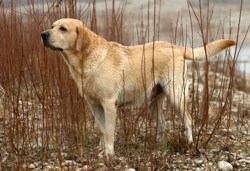
Some studies also show that the following dog breeds may have a larger chance of developing food allergies:
- Retriever
- Boxer
- Chinese Shar-Pei
- Cocker Spaniel
- Collie,
- Dachshund
- Dalmatian
- Lhasa Apso
- Miniature Schnauzer
- Soft Coated Wheaton Terrier
- Springer Spaniel
- West Highland White Terrier
What Are The Benefits Of Grain-Free Dog Food?
Why is grain-free better for dogs, and should dogs eat grain-free diets? Most vets today recommend that carbohydrates and grains make up a small portion of a dog’s diet (according to Dogster: 50% vegetables/40% meat protein/10% grains). Many grain-free dog foods (especially the moist and freeze-dried grain-free dog foods) contain more protein and animal fats and fewer carbohydrates than their grain-based counterparts and are therefore more easily digested.
Other benefits include:
- Helps keep dogs fuller longer resulting in eating less frequently (good news because grain-free/high-protein foods can be more expensive)
- May reduce canine food allergies
- More energy
- Fewer and smaller stools
- Healthier skin
- Shinier coat
- Less shedding
- Better breath
- Reduced flatulence
Is Grain-Free Food Good For Dogs?
If your dog is perfectly happy and healthy, then you may not need to make any dietary changes. A good rule of “paw”: always consult your vet before making any major changes to your pet’s diet.
In the meantime, check out the ingredients label on your dog’s food or the brand’s website. If they list corn, wheat or soy as the first ingredients, you may consider gradually switching to a formula the features protein (usually chicken) as one of the main ingredients.
Tips For Switching From Grain-Free Dog Food To Regular
If you decide to switch your dog from grain-based dog food to grain-free (or the other way around), don’t go cold turkey. Slowly introduce grain-free and higher protein dog food by mixing it in a little at a time. By gradually increasing amounts over the course of a few weeks, you allow your dog’s digestive system to adjust. During the switch, keep an eye on your pup’s stool to make sure they’re not constipated or suffering from diarrhea.
If you see any major concerns during the switch (hair loss, itching, lack of interest in eating or drinking water, etc.), contact your vet for next steps.
Read The Label: Low-Carb Misconceptions
One misconception is that grain free dog food is also low-carb. However, vegetables such as potatoes, sweet potatoes, green peas and tapioca often replace the grains in grain-free dog foods, especially in kibble foods, making them as high or higher in carbohydrates than grain-based dog foods. And, as mentioned above, vegetables are healthy for your pet and should make up almost half of their diet.
What About Puppies?
Diets high in protein can be damaging to puppies’ kidneys. Note that some grain-free dog food brands only recommend their food for adult dogs, while other brands have formulas for all life stages and dietary needs. Ask your vet to find out what would be best for your puppy.
Alternative Grain Formulas
A healthier alternative on the grain-based dog food spectrum to consider is “single whole grain” formulas. Some dogs with food sensitivities and allergies do well on single-grain dog foods.
Some grain-based dog food brands offer formulas that are more easily digestible for dogs with mild food sensitivities to severe food allergies. Their manufacturing process cooks the grains at lower temperatures for longer time periods than most regular grain-based dog foods. This results in more easily digestible grains because they are cooked more thoroughly.
Best Grain-Free Dog Food
Here are a few we recommend based on their reviews and nutrition.
The Farmer’s Dog
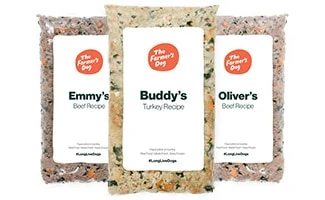
The Farmer’s Dog is one of the best overall grain-free options because it provides the freshest, human-grade ingredients for optimum health for your pup. Their subscription is formulated especially for your pup with the right portion and balance of nutrients your dog needs. And it’s flash-frozen so that you can store it in the freezer for months at a time.
Wellness CORE
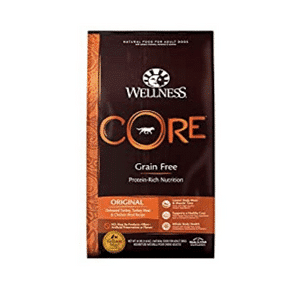
If your pup has allergies or doesn’t digest grains well, Wellness CORE’s kibble is a great choice. It contains 34% protein (deboned turkey and turkey and chicken meal), 16% fat content, and 4% fiber. This kibble also includes omega fatty acids from salmon oil and flaxseed to support a healthy coat and skin and antioxidants, glucosamine, probiotics, and taurine for overall body health.
Diamond Naturals

View Diamond Naturals on Amazon
Diamond Naturals grain-free foods provide optimal protein, fat, and amino acid levels. Their holistic formula contains glucosamine and chondroitin for joint health, probiotics for digestive health, and omega-6 and omega-3 fatty acids from superfoods to help maintain healthy skin and a shiny coat. It’s also made with sustainably sourced ingredients, including cage-free chicken, and contains no corn, wheat, fillers, preservatives, or artificial flavors or colors.
Will Your Dog Go Grain-Free?
Considering making the switch to a grain-free diet for your dog? The bottom line is it depends on your dog. So it’s worth trying out to see if you can notice a difference in their health and happiness. See all of our picks for best dog food.
Sources:
[1] “Best Grain Free Dog Foods” – DogFoodAdvisor.com
[2] “Update on Food Allergy in the Dog & Cat” World Small Animal Veterinary Assoc. World Congress-Vancouver 2001
[3] Grain-FreeDogFood.com
